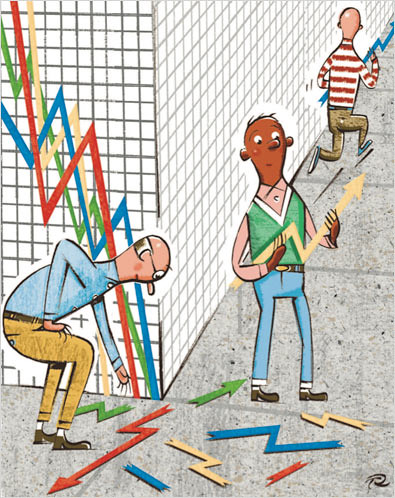Economy’s Woes Shift the Focus of Budget
By JACKIE CALMES
Recent signs that the economic recovery is flagging have introduced a new tension into the bipartisan budget negotiations.
The general assumption, which I have not shared, is that the money handed to banksters was meant to stimulate economic recovery to pre-2008 levels. I argued here that our non-bubble economy has shrunk and people become unskilled to the point that the trillions spent by Bush and Obama could only be intended to prop the status qvo ante. Why are people looking for reversing a trend? Because they were told so. Like in the past, except that our money is increasingly perceived as mostly backed by paper, by those who push gold above $15oo or switch from dollars to other currencies.
After the .com bubble there has been little in terms of sustainable economy that could use stimulus. Let's not forget, bubble money went into the real-estate and war economies. This had taken place while the effects of offshoring were masked by cheap (also subsidized) imports.
Some wake up now and ask for stimulus, yet others in the world have been awake, at least since the crisis in 2008. The latter are not willing to finance us anymore, hence the difficulty of dancing round the deficit vs. stimulus opposite poles.
I think those who fight deficits aim at accomplishing several things, of which one is ignored in the current debate: the external credibility of our system. I'm afraid that's been eroded and we are only seeing how people take calculated steps away from US. The recent Libyan episode is but an incomplete exception, which may itself prove to be temporary.
 So, while I can understand why there isn't and won't be a stimulus, I cannot understand why
So, while I can understand why there isn't and won't be a stimulus, I cannot understand why- People expect more stimulus, though it takes one to learn;
- People like Krugman call for more stimulus, since he's a learned man;
- The burden is not equally shared. By this, I mean the absence of higher taxation at the top, as in progressive tax. A VAT system, excluding those items that the lower income people depend on, may also be an option.
________________
A version of this has been posted at the NYTimes blog.






1 comment:
It's interesting reading 2 comments that get a lot of votes:
--------------8<---------------
16. Mark Canada
June 9th, 2011
8:55 am
There is something from Macro-economics 201 called the "balanced-budget multiplier". The way this works is that governments tax money away from people who aren't spending and can afford to pay, and then spending it on useful, job-creating endeavours. This increases total spending into the economy, increases employment and if spent on the right things increases future productivity without worsening the deficit - in fact reducing it as increased spending will result in increased tax collection. The key glitch is a political one - taxes need to be raised on the rich and powerful, and yes, for a while big government gets bigger. But in this kind of economic climate some such measures are necessary.
Recommended by 9 Readers
17. Jenny New Richmond, OH
June 9th, 2011
9:00 am
History shows us that the less we tax the very richest 2%, the worse the economy gets. When the rich are taxed more, the economy booms, like in the Kennedy years, and the Clinton years. It's also clear that the Bush tax cuts for the very wealthiest did not create jobs, so why continue these policies? Unless you are very rich, why would you advocate their continuation? I don't get that at all. Tax the richest, please. It works.
Recommended by 11 Readers
--------8<------------------------
While I replied to Mark, I think these two comments show the frustration of the public and the idea of a deficit of social justice that would be alleviated by taxation. Not sure we've got it all clear in our minds...
Here's my reply comment submitted to the NYTimes blog:
@Mark #16:
You rightly point out the necessity of adequate taxation, yet gloss over what people can actually spend the money on so that the economy grows, yet not the deficit.
Secondly, when your debt grows, so does the power of your creditors. We might have reached some point whereby our creditors have more power than we like to acknowledge.
Post a Comment